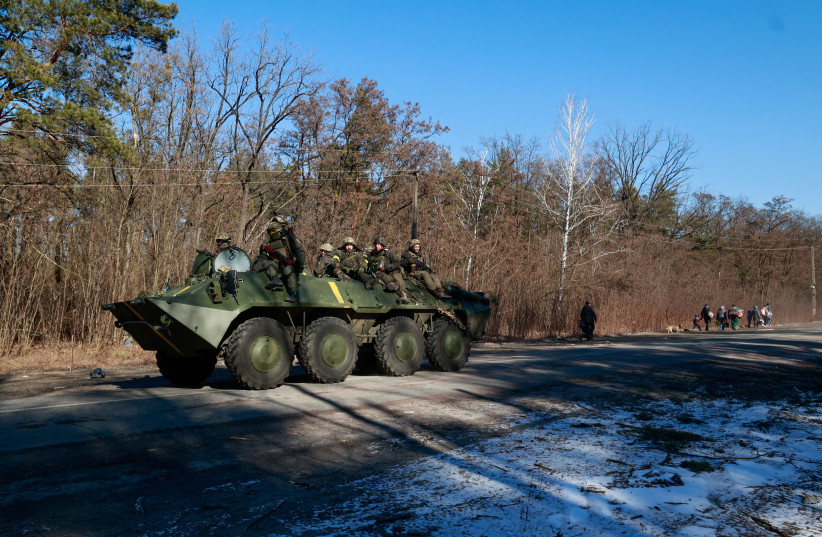The Russian invasion of Ukraine has given us an unexpected snapshot of the dueling realities and propaganda surrounding Israel. The truth: Israel has done what it can to help its Arab citizens and other Arabs to whom it owes nothing to find safety in the conflict. And yet for a substantial slice of the Left, Israel is South Africa reborn, a racist state segregating Arabs out for inhuman treatment. What actually happens on the ground – see Ukraine – doesn’t seem to dent this alternate reality.
What’s actually happening:
On February 12, with tensions mounting in Ukraine, Israel warned on its Arabic Twitter account, known as Israel in Arabic, that Israelis should not travel there. Two days later, the Arabic spokesperson for Israel’s Foreign Ministry tried to expedite the evacuation by announcing that five Ukrainian universities will allow Israeli students to study via Zoom amid the turmoil. Israel’s Arabic language social media messaging made sure its Arabic-speaking minority would face no language barriers while escaping Russian aggression.
Israel in Arabic’s pinned tweet from February 24, the start of the invasion, warns Israelis that the situation is dangerous and that they should leave Ukraine. The post linked to a website with specific instructions on how to exit. Israel in Arabic also tweeted the preferred border crossings Israelis should use, which crossings had Israeli officials stationed at them and how to reserve spots on buses to the border. To assist in evacuating Arabic-speaking Israelis, Israel dispatched its deputy consul in Turkey, Yara Shibli, a Bedouin, to the Ukrainian border.
Israeli-Arab parents have enjoyed tearful embraces with their children safely back in Israel. Popular Arab-Israeli media personality Eman Kassem Slimani praised Israel for rescuing hundreds of its Arab citizens from Ukraine, including many Bedouin.

And Jerusalem helped others. Israeli medics assisted a Gazan who approached them after seeing the Israeli flag. Israeli medics aided an Iranian. Israel also facilitated the evacuation of east Jerusalemite students fleeing Ukraine, most of whom are Israeli residents but not citizens. A Syrian sent Israel a thank you note for helping him. In another instance, an Israeli official invited a Lebanese citizen to board an Israeli bus headed for the border. Similarly, Israel helped individuals from Morocco escape.
But then there’s the alternate world of Israeli villainy: On February 1, Amnesty International held a press conference in the posh St. George’s Hotel in east Jerusalem to announce the release of its report condemning Israel for practicing apartheid. Even though Israel allowed this event to take place in its capital, Amnesty’s secretary-general, Agnès Callamard, called Israel a repressive regime. Leaders and officials in Israel, Germany, France, US and other countries have rejected Amnesty’s findings. But two weeks into Russia’s brutal campaign, Amnesty International’s Facebook banner photo still presents a call to end Israel’s apartheid.
In an interview after the launch of Amnesty’s report, Middle East and North Africa research and advocacy director Philip Luther acknowledged that Israel is democratic, but called it a smokescreen. In this view, Jerusalem’s rescue of its Arab citizens in Ukraine is just a ploy to whitewash its record and score points in the West.
What Amnesty doesn’t want to deal with: Israeli Arabs have full voting rights, serve in all professions, including as Supreme Court justices, and are treated equally in Israel’s hospitals. An Arab party is currently part of Israel’s governing coalition. And Israel has none of the separate beaches, bathrooms, water fountains, benches or other facilities that were the hallmarks of the South African regime. Nevertheless, Luther, Callamard, and their comrades argue that Israel need not resemble South Africa to be guilty of the crimes against humanity forever associated with South Africa.
Israel constantly wrestles with its identity as the world’s only Jewish state and its responsibility to represent its entire population, Arabs included. Jerusalem’s efforts to rescue its Arab citizens and fellow Middle Easterners from Ukraine are part of that struggle, even if they inconvenience certain narratives.
The writer is a senior research analyst at the Foundation for Defense of Democracies (FDD). Follow him on Twitter @DavidSamuelMay. FDD is a Washington-based, nonpartisan research institute focusing on national security and foreign policy.
